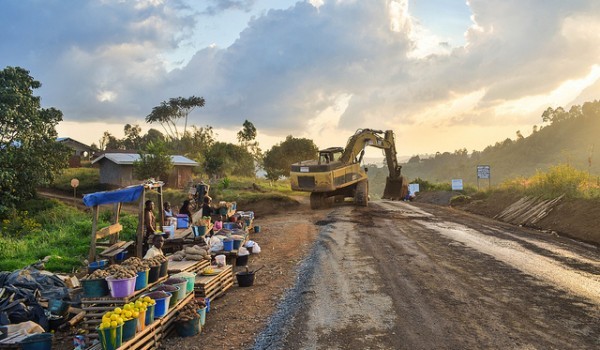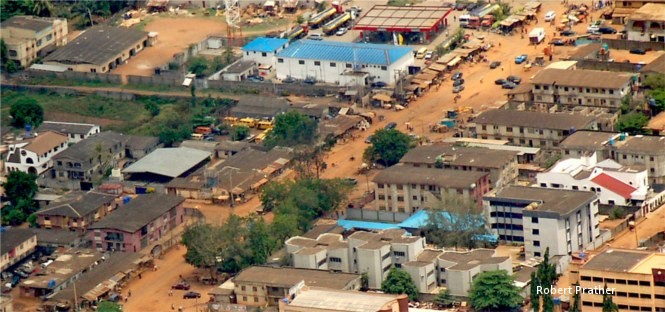Funding Africa s infrastructure gap
Post on: 26 Апрель, 2015 No Comment

Olutoyin Oyelade. Managing Partner at InVcap Corporation explains how investors can benefit from infrastructure investments in West Africa and why it is such a high growth sector now and for years to come.
InVcap is in currently in the market with a private equity fund focused on West Africa.
Why did you decide to launch this fund?
Given the slow pace of infrastructure development across Africa and funding being a major obstacle, asides other policy bottlenecks, InVcap sees a huge opportunity to arrange funds to meet these developmental infrastructure. Our interest in West Africa is driven by the region’s potential to develop at a very fast pace. The average economic growth rate across Africa is approximately 9.0% compared to 1.5% in France and US or 0.5% in the UK. Several African countries are also outpacing some parts of Asia and the BRIC countries and this trend is expected to continue. The growth is largely influenced by increasing liberalisation of trade policies, foreign direct investments and private funds, which are being channelled into the various productive sectors of these economies.
Although Africa continues to struggle with what is now termed an infrastructure deficit set at 12% of its total GDP or an annual USD of 93Bn required Funding till 2020 (AFDB Economic brief, 2010). In trying to address some of these issues, countries such as Nigeria, Ghana and Angola have set up infrastructure funding agencies where specialised Infrastructure providers can access cheaper and long term funding for developmental purposes. Infrastructure funding is also made available by bilateral and multilateral institutions. However, the impact is slow because of the huge gap to be covered both in infrastructure and funding. The funding gap challenge continues to stall major projects.
Why is there a need for infrastructure investment in West Africa?
Lets start with the statistics: The 2010 World Bank report on African Development highlights the poor rate of development:
- Only 5% of Africas hydro power has been tapped
- Only 1 in 3 Africans has access to all season roads
- Only 5% of African farmland is irrigated
- Only 1 in 4 Africans has access to electricity
- More than 30 out of the 53 African Nations experience chronic Power shortages.
The implication of all these presents a direct cut of 2% on GDP growth annually.
African infrastructure services are twice as expensive as elsewhere -including other ancillary services, most of which actually require rehabilitation. Although new hotel groups are springing up in most urban cities of Africa, the rates are near cutthroat. There is a huge opportunity to develop mid-low end hotels, residential structures, and affordable offices for small business owners too.
Given the very high growth rate of many African economies, the potential opportunities are immense. A few countries have been able to answer the question of development, backed up with some policy action and planned growth:
- In Uganda an emergency power solution targeted 1000 megawatts within its first phase. This was executed using emergency power plants, which later evolved into IPPs.
- With a USD 5Bn infrastructure development fund from the China Development Bank, Angola seems to be leading the cohort of African nations in development in the energy and construction sector.
95% of African nations have received different types of funding from China in the last 15 years, including South Africa. China also currently executes 50% of Infrastructure Projects in Africa, 30% of which is funded by the African Development Bank (ADB). China is the single largest investor in Africa, as of now it owns over 20% of the Standard Bank Group the largest banking group in Africa. Is this strategic? From what we see today the China Africa trade relationship is booming as well as being mutually beneficial.

So the question is why are we still so far away despite all these efforts? A lot more gaps in infrastructure needs a concerted funding effort.
What is your strategy to best capitalize on these opportunities?
InVcap will initially concert efforts on the high growth sectors of real estate development and tourism in West Africa and support these projects with energy and IT infrastructure for all round efficiency. It will also provide capital to underserved, high growth sectors in financial services.
Our strategy is to spread development across the region and investment will be targeted at high traffic cities, most of which constitute more than 10% of their respective economies and also target geographies that make up another 25% of their economies and population. These locations are in need of Infrastructure such as transport, energy and other services in the tourism sector. By adopting the public/private partnerships and JV structures in these countries, InVcap will target infrastructure investment opportunities in these regions-
InVcap plans to set sectorial limits and diversify its investment portfolio by industry using the expertise of industry practitioners on its advisory team. Investors may need to consider diversifying the concentration of investments in specific locations and their potential for consistent income in the near future, given other identified risks.
In Ghana, the huge opportunities in residential housing, tourism development and its capacity for good returns, coupled with minimal government intervention, certainly makes it a sector worth considering for investment.
How relevant is it that investors travel to the regions where their money finally will be invested?
African economies are looking to restructure and a veritable private sector is developing in many of these economies. Family-run companies are increasingly looking at inviting institutional investors, venture capitalists and private equity funds to become shareholders given the challenges that many of these businesses have in raising capital through debts.
Similarly, governments across the continent are beginning to realise the potential of the private sector in increasing the countrys tax (revenue) base. These governments now view institutional investors as long-term investors who bring professionalism and accountability coupled with the ability to expand market opportunities using their marketing networks. They are therefore more appealing than large multi-national corporations.
All these factors and a higher literacy ratio is rapidly spreading across Nigeria, Ghana and Gambia and presents a potential investment opportunity in sectors such as commercial real estate, tourism, consumer, energy and infrastructure. Nigeria has the highest market size to population index of 125.1Mn, even surpassing South Africa. Compared to other West African countries Ghana and Nigeria are leading in economic indicators like PPP, GDP and market size.
Investment opportunities are often not considered because they are not visible to the right investors. Investors have to be made aware of these opportunities and also understand them to be convinced about their potential.
Investors need to see and assess these markets and interact with its people to understand what it takes to invest in them.
Olutoyin Oyelade
Managing Partner
InVcap Corporation
Olutoyin (Olu) is the Managing Partner at InVcap and oversees the Management of the firm’s private equity and funds. She has over 20 year’s experience in Investment Banking, Funds management, Global transaction banking, Structured Finance, due diligences, Fixed Income sales.
Prior to joining InVcap Olu was Group Executive of Investment management at Intercontinental Group (IBG) where she managed a fund portfolio of $8bn. As Group Treasurer she was involved in the successful fund-raise of $1.3bn in debts and equity from the global markets in 2009. Olu was a member of the Investment Committee with the responsibility for group-wide fund investment and fixed income sales. In addition she was directly involved in the approval process of more than 250 financial sector investment deals. Her career has taken her to different countries including UK, France and USA where as a Senior Management Intern at BNP Paribas, she understudied Assets & Investment Trading (Foreign Reserves).
Olu holds an MBA from the University of Ife, a Bachelor’s degree in Philosophy and is a graduate of Wharton School’s Advanced Management program, IMD Switzerland’s Business Marketing and Lagos Business School’s (with IESE Spain) Senior Management Program. She is a CPD UK certified Advanced Investment Manager.
InVcap have decided to start a fund to facilitate the process of executing infrastructure related projects in West Africa. The team has successfully delivered 20 commercial real estate projects in the last 10 years under the name Casa Consult.
With investment experience garnered by serving on the Investment committee of various emerging market investment firms and investment banks, the InVcap team members set to work on the fund having been directly involved with the analysis, approval and investments of over 250 private sector investments in more than 12 emerging countries.














